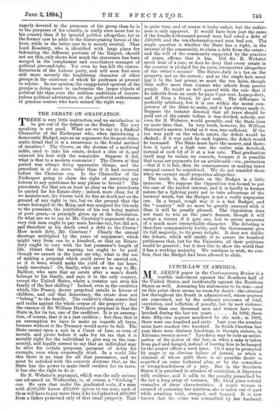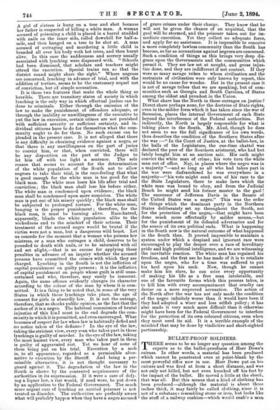LYNCH-LAW IN AMERICA.
MR. AKED'S paper in the Contemporary Review is a terrible indictment against the Southern half of the United States, and incidentally against the Northern States as well. Assuming his statements to be true—and on this point there seems no room for doubt—the criminal law throughout the South is administered, where negroes are concerned, not by the ordinary processes of trial, conviction, and infliction of penalty, but by mob violence. "More than one thousand men and women have been lynched during the last ten years In 1882, there were fifty-two negroes murdered by the mob ; in 1892, there were one hundred and sixty. Last year the number must have reached two hundred. In South Carolina last year there were thirteen lynchings, in Georgia sixteen, in Alabama twenty-seven." Lynching may be only an.antici- pation of the action of the law, as when a man is taken from gaol and hanged, instead of leaving him to be hanged by the proper officer a week later. Or it may be prompted by anger at an obvious failure of justice, as when a criminal of whose guilt there is no possible doubt is acquitted on some technical plea, or by the cowardice or wrong-headedness of a jury. But in the Southern States it is practised in advance of conviction, it dispenses with evidence, and it adds to the penalty prescribed by the law a long array of tortures. Mr. Aked gives several examples of these characteristics. A negro woman is accused of poisoning, her mistress, she is taken out of gaol while awaiting trial, stripped, and hanged. It is now known that the crime was committed by her husband. A girl of sixteen is hung on a tree and shot because her father is suspected of killing a white man. A woman accused of poisoning a child is placed in a barrel studded with nails on the inner side, rolled downhill for half-a- mile, and then hanged on a tree to be shot at. A man accused of outraging and murdering a little child is branded all over his body with hot irons, and then burnt alive. In this case the suddenness and secrecy usually associated with lynching were dispensed with. "Schools had been dismissed, that scholars and teachers might attend the execution. Special trains ran so that the district round might share the sight." Where negroes are concerned, lynching in advance of trial, and with the addition of torture, seems to be the customary sequel not of conviction, but of simple accusation. It is these two features that make the whole thing so horrible. There are transitory states of society in which lynching is the only way in which effectual justice can be done to criminals. Either through the omission of the law to make the punishment of offenders adequate, or through the inability or unwillingness of the executive to put the law in execution, certain crimes are not punished with sufficient severity or sufficient certainty, and in- dividual citizens have to do for themselves what the com- munity ought to do for them. No such excuse can be pleaded in the present case. It is not alleged that there is any difficulty in obtaining evidence against a negro, or that there is any unwillingness on the part of juries to convict him, or that, when convicted, there will be any disposition on the part of the Judges to let him off with too light a sentence. The sole reason that seems to account for the determination of the white population of the South not to allow negroes to take their trial, is the race-feeling that what is good enough for the white man is too good for the black man. The white man loses his life after trial and conviction ; the black man shall lose his before either. The white man is condemned upon evidence ; the black man shall be condemned upon mere suspicion. The white man is put out of his misery quickly ; the black man shall be subjected to prolonged torture. For the white man, hanging is the proper punishment ; therefore, for the black man, it must be burning alive. Race-hatred, apparently, blinds the white population alike to the wickedness and to the mischief of their actions. Their treatment of the accused negro would be brutal if the victim were not a man, but a dangerous wild beast. Let us concede for the moment that a woman who poisons her mistress, or a man who outrages a child, deserves to be pounded to death with nails, or to be saturated with oil and set alight,—that is no excuse for applying these penalties in advance of an inquiry whether the accused persons have committed the crimes with which they are charged. Lynching in the South is not the infliction of capital punishment on guilty persons ; it is the infliction of capital punishment on people whose guilt is still unas- . eertained and who, therefore, may easily be innocent. Again the same offence evidently changes its character according to the colour of the man by whom it is com- mitted. It is a filing to be noted that, in some of the very States in which these lynchings take place, the age of -consent for girls is absurdly low. It is not the outrage, -therefore, that so shocks public opinion, as the fact that the .author of it is a negro. The habitual commission of brutal injustice of this kind must in the end degrade the corn- an unity in which it is permitted, and even encouraged. What becomes of respect for law when law is habitually defied and aio notice taken of the defiance ? In the eye of the law, taking the strictest view, every man who takes part in these lynchings is guilty of murder. In the eye of the law, taking the most lenient view, every man who takes part in them is guilty of aggravated riot. Yet we hear of none of them being put on his trial. Execution by a mob is, to all appearance, regarded as a permissible alter- native to execution by the Sheriff. And being a per- missible alternative, it is not thought necessary to guard against it. The degradation of the law in the South is shown by the contented acquiescence of the authorities in its supersession. If it were a case of defy- ing a liquor law, a riot would, if need were, be put down by an application to the Federal Government. The much more urgent case of lynching an untried prisoner is not treated as disorder. The authorities are perfectly aware what will probably happen when they have a negro accused of grave crimes under their charge. They know that he will not be given the chance of an acquittal, that the gaol will be stormed, and the prisoner taken out for im- mediate execution. Yet they collect no adequate force, and apply for no assistance. It is impossible to conceive a more completely lawless community than the South has become, so far as accusations against negroes are concerned. Such a condition of things as this brings very deep dis- grace upon the Governments and the communities which permit it. They see law set at nought, and gross injus- tice done, and they are indifferent if not content. If they were so many savage tribes to whom civilisation and the restraints of civilisation were only known by report, this would be no cause for wonder. But in the present case it is not of savage tribes that we are speaking, but of com- munities such as Georgia and South Carolina, of States among the oldest and proudest in the Union.
What share has the North in these outrages on justice ? Direct share perhaps none, for the doctrine of State rights, even in the milder form which it has taken since the war of Secession, places the internal Government of each State beyond the interference of the Federal authorities. But indirectly, the North is largely responsible for what is taking place in the South. Mr. Aked, though he does not seem to see the full significance of his own words, thus describes the condition of the Southern States after the war :—" In the Court of Justice, at the ballot-box, in the halls of the Legislature, the one-time chattel was declared the peer of the Southern aristocrat, who had but lately bought him at an auction sale. His oath might convict the white man of crime ; his vote turn the white man out of office. Nay, in places where the negro was in a majority "—and so long as all who had taken part in the war were disfranchised he was everywhere in a majority—" his vote might send men of his race to the the State Legislature, there to make laws which the white man was bound to obey, and from the Judicial Bench he might send his former master to the gaol ! The successor of Jefferson Davis in the Senate of the United States was a negro." This was the order of things which the dominant party in the Northern States deliberately set up throughout the South, not for the protection of the negro;—that might have been done much more effectually by milder means,—but for the punishment of its defeated adversaries and for the source of its own political ends. What is happening in the South now is the natural outcome of what happened in the South then. It proved impossible to maintain a system under which a despised and ignorant race were encouraged to play the despot over a race of hereditary pride and, high political intelligence, and we are witnessing the inevitable reaction. The white man has regained his freedom, and the first use he has made of it is to retaliate upon the negro, who for a time was suffered to put his heel upon his neck. Now, though he cannot make him his slave, he can seize every opportunity of making his life as a free man intolerable, and one of the favourite forms which this process takes, is to kill him with every accompaniment that cruelty can devise on a mere unproved accusation. The action of the North after the war has not only made the condition of the negro infinitely worse than it would have been if they had adopted a wiser and less selfish policy; it has also made it very much more difficult than it otherwise might have been for the Federal Government to interfere for the protection of its own coloured citizens, even when they most need its aid. It is a terrible example of the mischief that may be done by vindictive and short-sighted partisanship.







































 Previous page
Previous page